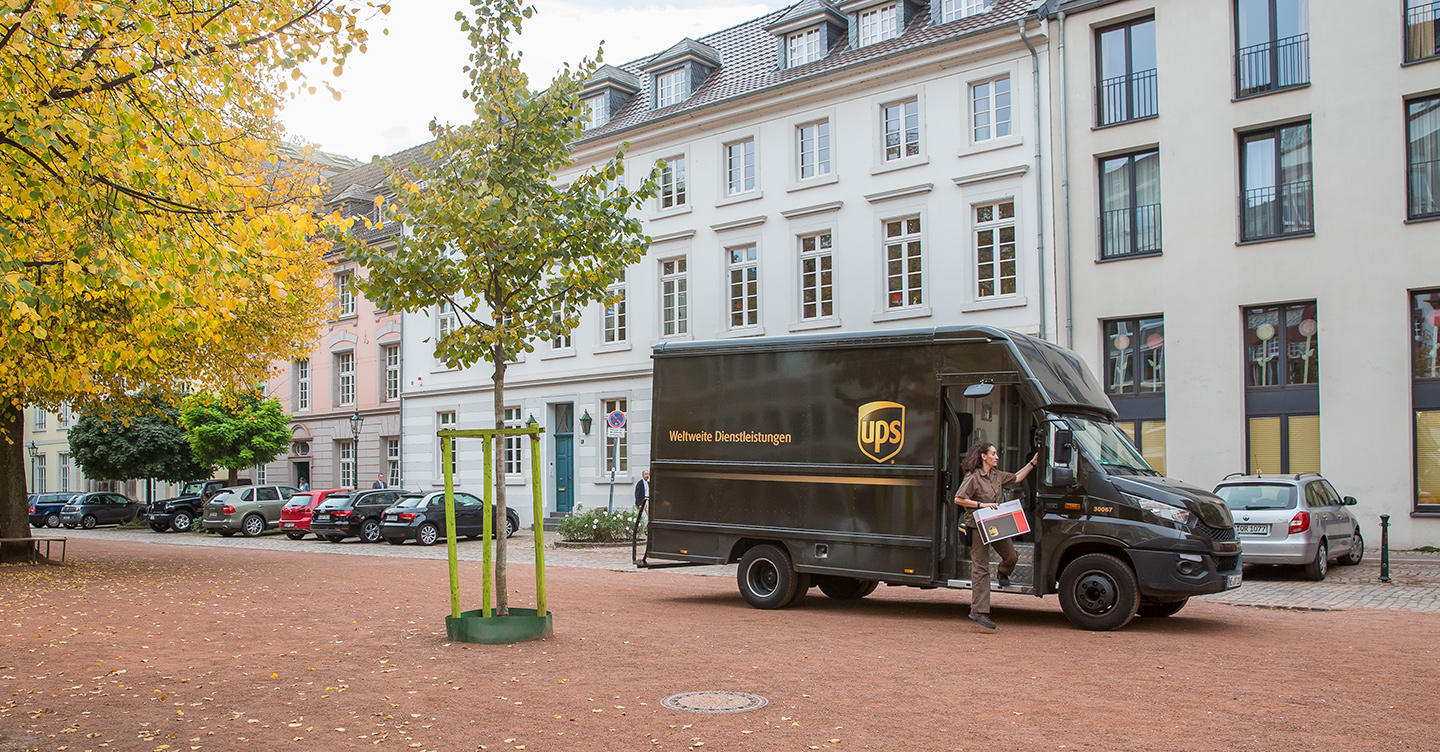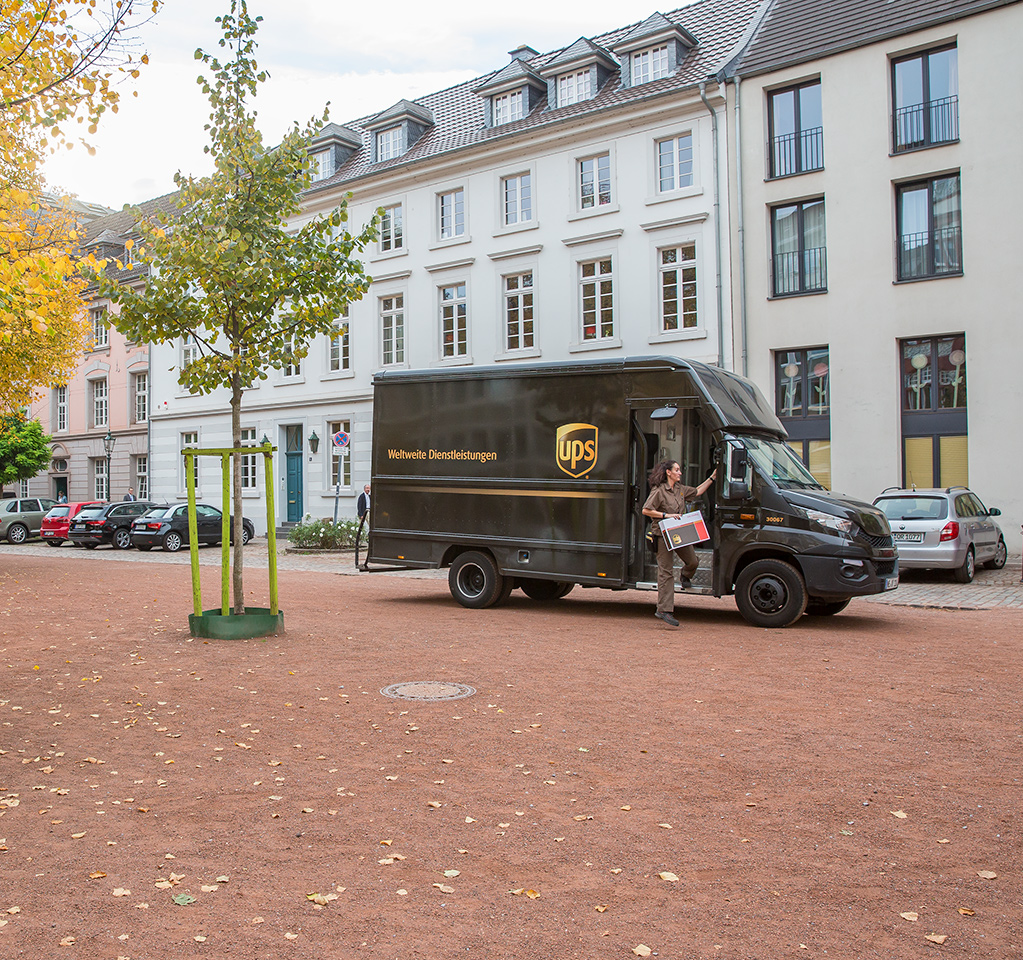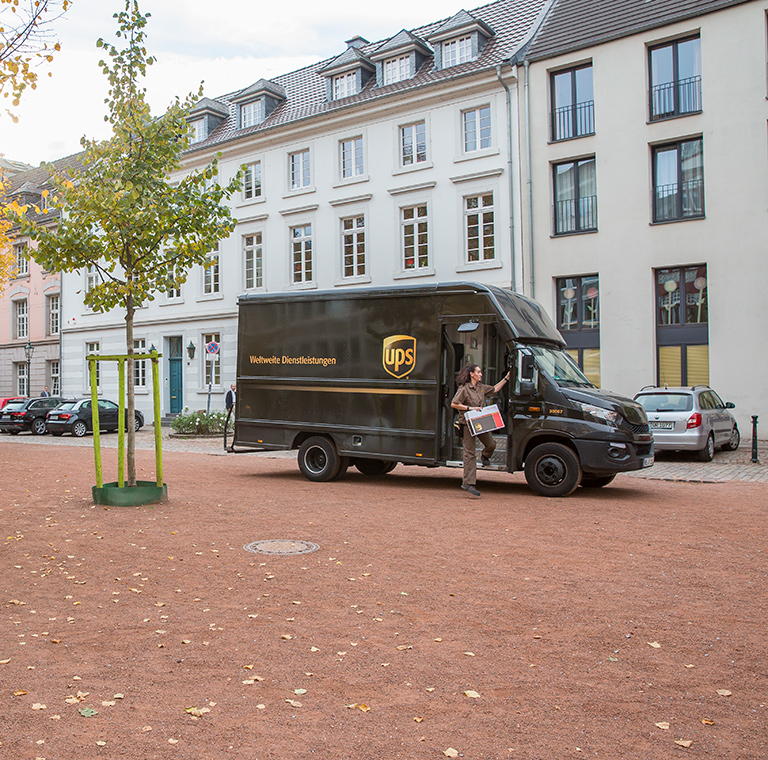DE
Cologne
- New 7.5 tonne electric vehicle joined fleet as part of pilot project
- Features latest dual-motor electronically-driven rear axle technology for greater power, enhanced maneuverability
- Emission-reducing e-vehicles in UPS’s “rolling laboratory” are part of wider strategy to continuously expand alternative fuel fleet
UPS (NYSE:UPS) and BPW announced today that the companies are testing a new e-vehicle model in Germany. The next-generation UPS delivery truck is a converted diesel vehicle that incorporates an innovative dual-motor rear axle drive developed by BPW, and is now making deliveries in central Cologne. This test is part of UPS’s ongoing dual commitment to innovation and reducing the environmental impact of its services.
“The BPW-converted electric vehicle is breaking new ground in automotive technology, and demonstrates the strength of innovation to be found among German Mittelstände. Of course, we are excited to see how the drive proves itself in daily operations,” says Frank Sportolari, president, UPS Germany.“Our goal as a company is to have 25% of our new vehicle purchases running on alternative fuels or advanced technologies by 2020. This is part of the continuous transformation of UPS’s smart global logistics network – and it’s a tangible, visible transformation that can be seen daily on the roads of the communities we serve.”
The test vehicle currently on the streets of Cologne is a conventional 7.5 tonne UPS delivery truck that has been converted to run on electricity with a dual-motor rear axle, and has an approximately range of 100 km. The refit was carried out by BPW, based in Wiehl. Two motors and the transmission are integrated into the rear axle. Power is provided by an 84 kwh battery, which is enough capacity to provide a household of four people with energy for a week1. The combination of independent drives on each rear wheel and the power of the motors increases the maneuverability of the delivery truck. For example, on slippery roads, each wheel receives the optimum torque for the acceleration force required.
“The electric axle drive is the superior solution for the future of urban transport. Without losing any payload, it drastically reduces pollution and noise compared to a conventional internal combustion engine. With a powerful 3,290 Newton meters per wheel, our e-transport drive technology has nearly ten times the torque of an average four-cylinder car engine, which means it can handle high payloads and the steep inclines typical of urban operations,” said Markus Schell, personally liable managing partner, BPW. “We are very pleased that UPS, one of the world’s largest courier, express and parcel logistics companies, is testing our drive system for the first time.”
UPS has been using electric vehicles for parcel delivery in Germany since 2008. As there are no purely electric 7.5-tonne vehicles currently available on the market, UPS began converting conventional diesel vehicles in 2010. Currently, more than 80 fully-electric vehicles are in use in Germany, primarily 7.5-tonne class vehicles. To support its emissions reduction objectives, UPS has set a goal of sourcing 40% of its ground fuel from low carbon or alternative fuels by 2025. In addition, 25% of new vehicle purchases annually by 2020 will be alternative fuel or advanced technology vehicles.
“The collaboration between UPS and BPW is helping drive innovation across the automotive industry, providing sustainable modes of transportation that act as an incubator for change,” said Luke Wake, automotive director, UPS International. “UPS has a global network that can integrate ground-breaking vehicle component suppliers and manufacturers, which moves the automotive market forward faster, delivering sustainable, low-emission solutions that work today and can scale up tomorrow.”
“German small and medium enterprises (SMEs) are highly innovative, and create products and services that help us as a company to become better for our customers – or in this case, more efficient,” said Thomas Zeller, marketing director UPS Germany. “UPS is also a big supporter of SMEs by helping get their products to market reliably around the world while shortening delivery times and reducing times in transit.”
Using its “rolling laboratory” approach, UPS deploys approximately 10,000 low-emission vehicles worldwide to determine what alternative fuel and advanced technology vehicles work best in various routes and duty cycles. This includes all-electric, hybrid electric, hydraulic hybrid, ethanol, compressed natural gas (CNG), liquefied natural gas (LNG) and propane.
You can find more information about the sustainability initiatives at UPS by visiting www.ups.com/sustainability. Further information on the ongoing investments by UPS in its natural gas fleet and renewable natural gas is published in the company’s annual Sustainability Report, last issued on 26 June 2018.
1. Stromspiegel für Deutschland 2019 – Electric energy consumption of an average household of four people without electric water heating
About UPS
UPS (NYSE: UPS) is a global leader in logistics, offering a broad range of solutions including transporting parcels and freight; facilitating international trade, and deploying advanced technology to more efficiently manage the world of business. UPS is committed to operating more sustainably – for customers, the environment and the communities we serve around the world. Head-quartered in Atlanta, UPS serves more than 220 countries and territories worldwide. UPS was awarded America’s Best Customer Service company for Shipping and Delivery services by Newsweek magazine; Fortune magazine’s Most Valuable Brand in Transportation; and top rankings on the JUST 100 list for social responsibility, the Dow Jones Sustainability World Index, and the Harris Poll Reputation Quotient, among other prestigious rankings and awards. The company can be found on the web at ups.com or pressroom.ups.com and its corporate blog can be found at longitudes.ups.com. The company’s sustainability eNewsletter, UPS Horizons, can be found at ups.com/sustainabilitynewsletter. Learn more about our sustainability efforts at ups.com/sustainability. To get UPS news direct, follow @UPS_News on Twitter.
About the BPW Group
The BPW Group researches, develops and manufactures everything needed to ensure that transport keeps moving and is safe, illuminated, intelligent and digitally connected. With its brands BPW, Ermax, HBN, HESTAL and idem telematics, the company group is a preferred system partner of the commercial vehicle industry around the globe for running gear, brakes, lighting, fasteners and superstructure technology, telematics and other key components for trucks, trailers and buses. The BPW Group offers comprehensive mobility services for transport businesses, ranging from a global service network to spare parts supply and intelligent networking of vehicles, drivers and freight. The owner-operated company group currently employs 7,200 staff in more than 50 countries and achieved consolidated sales of 1.48 billion euros in 2017. www.bpw.de


